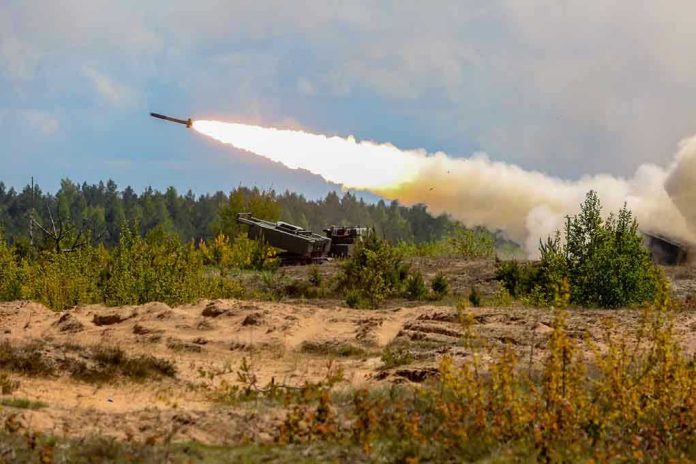
Just days after President Trump led high-stakes peace talks, a Russian missile strike on a U.S.-owned civilian factory in western Ukraine signals a direct threat to American investment and global stability.
Story Snapshot
- Russian missiles struck a U.S.-owned Flex electronics factory in Mukachevo, western Ukraine, injuring up to 19 civilians and causing major damage.
- The attack targeted a non-military American-invested site, far from active front lines, undermining recent Trump-led diplomatic efforts.
- Ukraine and allies denounce the strike as a blatant attack on civilian infrastructure and a warning to Western business interests in Ukraine.
- The incident raises serious questions about Russia’s commitment to peace and the safety of U.S. investments abroad.
Russian Missile Strike Targets U.S.-Owned Civilian Facility
On August 21, 2025, Russian forces launched a massive missile and drone assault across Ukraine, with one missile directly hitting the Flex electronics factory in Mukachevo, Zakarpattia Oblast. The facility, owned by an American company and producing everyday household items, suffered significant structural damage. At least 15 to 19 workers were injured, prompting immediate emergency response. Ukrainian officials and President Volodymyr Zelenskyy condemned the strike, highlighting the factory’s purely civilian function and American investment, and called out Russia’s disregard for international norms.
The Mukachevo attack stands out for its location and symbolism. Western Ukraine, particularly Zakarpattia, has largely avoided the brunt of the fighting since Russia’s full-scale invasion began in 2022. By striking deep into a region considered relatively safe and hitting a U.S.-owned facility, Russia has sent a clear message to both Ukraine and its Western backers. The strike followed closely on the heels of high-profile peace talks involving President Trump, Russian President Putin, and President Zelensky, fueling skepticism about Moscow’s sincerity in diplomatic negotiations.
Russian missiles hits US-owned factory in Ukraine days after Trump-led peace talks https://t.co/pBrp7nYVIb
— ConservativeLibrarian (@ConserLibrarian) August 21, 2025
Political and Economic Fallout for Western Interests
The strike on Flex’s factory, a prominent symbol of American business presence in Ukraine, raises the stakes for U.S. investors and foreign companies operating in conflict zones. In the immediate aftermath, the factory’s operations have been severely disrupted, and the local community faces social and economic trauma. Short-term impacts include injuries, loss of employment, and heightened insecurity among civilians and business owners. Long-term, the attack could trigger a chilling effect on foreign investment in Ukraine, as businesses reassess the risks of maintaining operations or launching new ventures in the country.
Beyond economic consequences, the incident puts added political pressure on the U.S. administration to respond forcefully in defense of American interests and values. Conservative observers, particularly those who value strong national defense and constitutional protections for American property, may see the attack as a direct challenge to U.S. sovereignty abroad. The incident also highlights the limitations of diplomatic engagement with adversaries who act in bad faith, challenging the effectiveness of recent peace initiatives led by President Trump and allied leaders.
Broader Implications: Security, Diplomacy, and Conservative Concerns
Security analysts emphasize the symbolic weight of Russia’s choice of target—a U.S.-owned, non-military facility—interpreting it as a warning to Western governments and investors considering deeper engagement with Ukraine. Ukrainian officials and Western media uniformly describe the factory as a civilian site, with no links to military production or defense. While Russia has previously targeted civilian infrastructure such as energy and residential buildings, direct strikes on American-owned factories in western Ukraine are rare, marking a notable escalation in tactics.
For American conservatives, this incident spotlights the ongoing threats to U.S. interests abroad and the need for firm, constitutionally grounded leadership. The strike underscores why border security, a strong national defense, and prudent foreign engagement remain top priorities for the Trump administration and its supporters. As the U.S. weighs next steps, many will be watching for policies that defend American businesses, protect families, and deter adversaries from further targeting Western investments or values.
Expert and Official Perspectives on the Attack
Statements from Ukrainian leadership, international observers, and business risk experts converge on several points: the Flex factory was a legitimate, non-military enterprise; the attack was part of a larger Russian campaign to destabilize Ukraine and intimidate its supporters; and the strike challenges the efficacy of diplomatic efforts to end the conflict. Academic commentary frames the incident as a potential violation of the laws of armed conflict, given the civilian status of the target. The broader consensus is that this escalation undermines trust in Russia’s commitment to peace and signals increased risk for foreign stakeholders in Ukraine.
Sources:
Russian attack hits US electronics plant in western Ukraine — The Kyiv Independent
Russia-Ukraine war: Trump, Putin, Zelenskyy peace talks — CBS News
Russia launches several missiles at coffee machine factory in Zakarpattia — Ukrinform
Russian missile strike on US civilian factory in Mukachevo, Ukraine — Economic Times
Ukraine-Russia attack: American business missile drone Zakarpattia Mukachevo Zelensky — UPI







